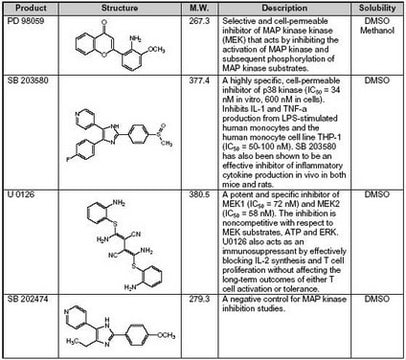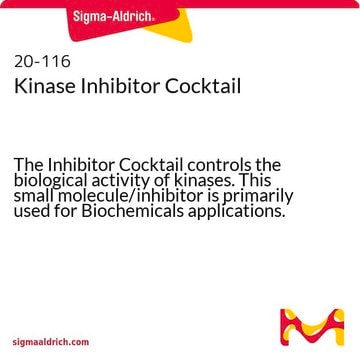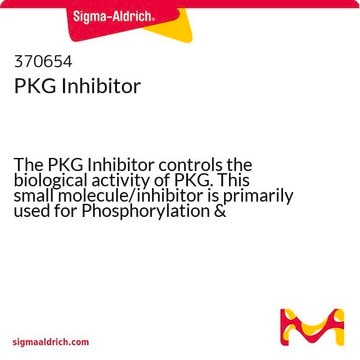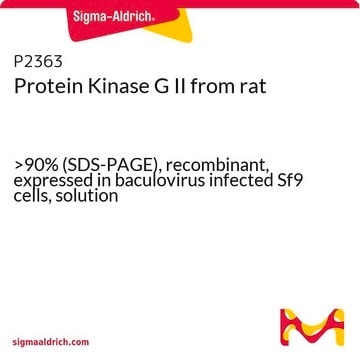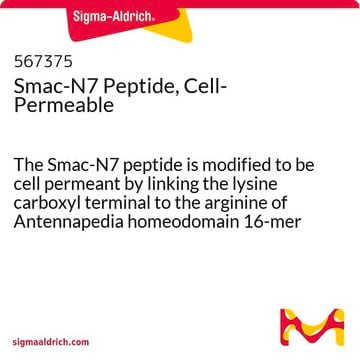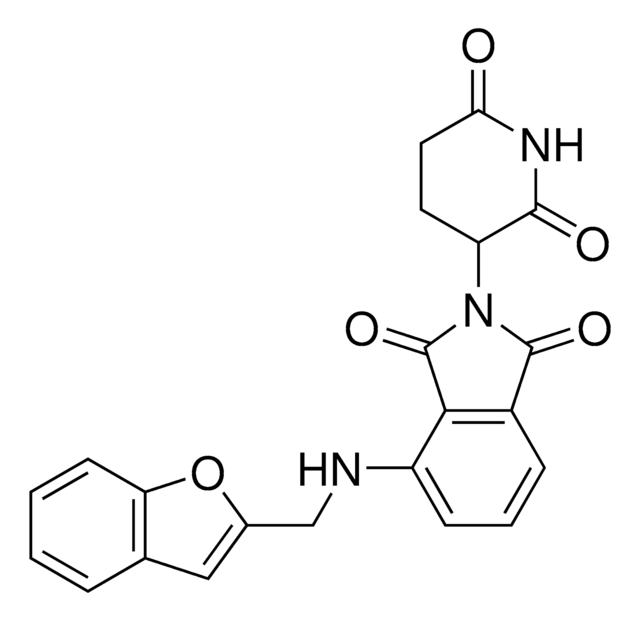539572
Serine/Threonine Kinase Inhibitor Set
The Serine/Threonine Kinase Inhibitor Set controls the biological activity of Serine/Threonine Kinase. This small molecule/inhibitor is primarily used for Phosphorylation & Dephosphorylation applications.
Iniciar sesiónpara Ver la Fijación de precios por contrato y de la organización
About This Item
UNSPSC Code:
12352200
NACRES:
NA.54
Productos recomendados
Quality Level
form
solid
manufacturer/tradename
Calbiochem®
storage condition
OK to freeze
desiccated (hygroscopic)
protect from light
solubility
DMSO: 1 mg/mL (all other inhibitors)
water: 1 mg/mL (Protein Kinase G Inhibitor)
shipped in
ambient
Storage temp.
−20°C
General description
A convenient set that offers several highly selective serine/threonine kinase inhibitors. Kinases play an important role in numerous signaling cascades. Highly selective protein kinase inhibitors are useful for dissecting these cascades to determine which specific kinases are involved in producing particular biological effects. The Serine/Threonine Kinase Inhibitor Set contains the following highly selective serine/ threonine kinase inhibitors in one convenient set:
• Bisindolylmaleimide I (Cat. No. 203290), 250 µg
• H-89, Dihydrochloride (Cat. No. 371963), 1 mg
• KN-93 (Cat. No. 422708), 1 mg
• ML-7 (Cat. No. 475880), 1 mg
• Protein Kinase G Inhibitor (Cat. No. 370654), 1 mg
• Staurosporine (Cat. No. 569397), 100 µg
• Bisindolylmaleimide I (Cat. No. 203290), 250 µg
• H-89, Dihydrochloride (Cat. No. 371963), 1 mg
• KN-93 (Cat. No. 422708), 1 mg
• ML-7 (Cat. No. 475880), 1 mg
• Protein Kinase G Inhibitor (Cat. No. 370654), 1 mg
• Staurosporine (Cat. No. 569397), 100 µg
Biochem/physiol Actions
Cell permeable: yes
Primary Target
PKA
PKA
Secondary Target
PKC, MLCK, Cam kinase II, PKG
PKC, MLCK, Cam kinase II, PKG
Warning
Toxicity: Multiple Toxicity Values, refer to MSDS (O)
Reconstitution
Following reconstitution, aliquot and freeze (-20°C). Stock solutions of each inhibitor are stable for up to 3 months at -20°C.
Other Notes
Martiny, G., et al. 1993. J. Biol. Chem.268, 9194.
Toullec, D., et al. 1991. J. Biol. Chem.266, 15771.
Chijiwa, T., et al. 1990. J. Biol. Chem.265, 5267.
Simu, M., et al. 1991. Biochem. Biophys. Res. Commun.181, 968.
Saitoh, M., et al. J. Biol. Chem.262, 7796.
Glass, D.B., et al. 1983. Biochem. J.213, 159.
Seynaeve, C.M., et al. 1994. Mol. Pharmacol.45, 1207.
Meyer, T., et al. 1989. Int. J. Cancer43, 851.
Toullec, D., et al. 1991. J. Biol. Chem.266, 15771.
Chijiwa, T., et al. 1990. J. Biol. Chem.265, 5267.
Simu, M., et al. 1991. Biochem. Biophys. Res. Commun.181, 968.
Saitoh, M., et al. J. Biol. Chem.262, 7796.
Glass, D.B., et al. 1983. Biochem. J.213, 159.
Seynaeve, C.M., et al. 1994. Mol. Pharmacol.45, 1207.
Meyer, T., et al. 1989. Int. J. Cancer43, 851.
Legal Information
CALBIOCHEM is a registered trademark of Merck KGaA, Darmstadt, Germany
signalword
Warning
hcodes
Hazard Classifications
Aquatic Chronic 4 - Repr. 2
Storage Class
11 - Combustible Solids
Certificados de análisis (COA)
Busque Certificados de análisis (COA) introduciendo el número de lote del producto. Los números de lote se encuentran en la etiqueta del producto después de las palabras «Lot» o «Batch»
¿Ya tiene este producto?
Encuentre la documentación para los productos que ha comprado recientemente en la Biblioteca de documentos.
Nuestro equipo de científicos tiene experiencia en todas las áreas de investigación: Ciencias de la vida, Ciencia de los materiales, Síntesis química, Cromatografía, Analítica y muchas otras.
Póngase en contacto con el Servicio técnico